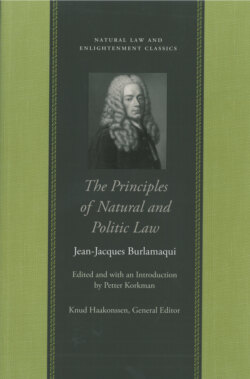Читать книгу The Principles of Natural and Politic Law - Jean-Jacques Burlamaqui - Страница 12
На сайте Литреса книга снята с продажи.
ОглавлениеTHE TRANSLATOR TO THE READER.
The author of the following work, M. J. J. Burlamaqui, was descended from one of those noble families of Lucca, which, upon their embracing the Protestant religion, were obliged about two centuries ago to take shelter in Geneva. His father was counsellor and secretary of state; honours which are frequently conferred in that city upon such as acquit themselves worthily of a professorship in the academy, particularly that of law, the fittest without doubt to form able judges, magistrates, and statesmen. The son, upon his return from his travels, was immediately nominated professor of this science, in which post he continued a considerable number of years, till the republic thought proper to remunerate his long and eminent services, by raising him to the same dignity as his father. The great reputation he acquired in his professorship, was less owing to his immense erudition, in which he equalled if not excelled all his predecessors, than to the quickness of his understanding, the clearness of his ideas, his sound and judicious views in the study of jurisprudence, and especially to the solidity of his principles on natural law and civil government. With regard to the occasion of his publishing these principles, he observes himself in his preface, that it was in some measure to comply with the importunity of his friends, but chiefly to prevent his reputation from being injured by a precipitate impression from any of those imperfect and surreptitious copies which had been handed about by his pupils. The public indeed had flattered themselves a long time with the hopes of seeing a complete course of the law of nature and nations from this eminent hand; but his occupations and infirmity obliged him to frustrate their expectations. However, as a good introduction to this science was extremely wanted, he thought proper, till he could publish his larger work, to favour us with the following principles, being convinced that in this, as in every other branch of learning, the most essential part is the laying of a proper and solid foundation. In fact, we daily observe that most errors in life proceed rather from wrong principles, than from ill-drawn consequences.
M. Burlamaqui is so modest as to consider these principles, as calculated only for young people, who are desirous of being initiated into the study of natural law; and yet we may venture to affirm it is a performance of general utility, but especially to such as have had the misfortune of neglecting this science in their younger days. It is a performance that must certainly be allowed to have the merit of an original undertaking, by our author’s ascending always to the first principles, by his illustrating and extending them, by his connecting them with each other, and by exhibiting them frequently in a new light. But his singular beauty consists in the alliance he so carefully points out between ethics and jurisprudence, religion and politics, after the example of Plato and Tully, and the other illustrious masters of antiquity. In effect, these sciences have the same basis, and tend to the same end; their business is to unravel the system of humanity, or the plan of providence with regard to man; and since the unity of this system is an unquestionable point, so soon as writers ascend to the principles, in order to view and contemplate the whole, it is impossible but they all should meet.
Our author’s method has nothing of the scholastic turn. Instead of starting new difficulties, he prevents them by the manner of laying his thesis; instead of disputing, he reconciles. Far from pursuing any idle or too subtle ideas, he follows nature step by step, and derives his arguments from sense and experience. His thoughts he unfolds with the greatest perspicuity and order; and his style is pure, clear, and agreeable, such as properly becomes a didactic work. In fine, he has the honour of preserving the character of a Christian philosopher, by inculcating the value we ought to set upon the light of revelation, a light which so advantageously assists the feeble glimmerings of reason in the high and important concerns of our civil and religious duties.
